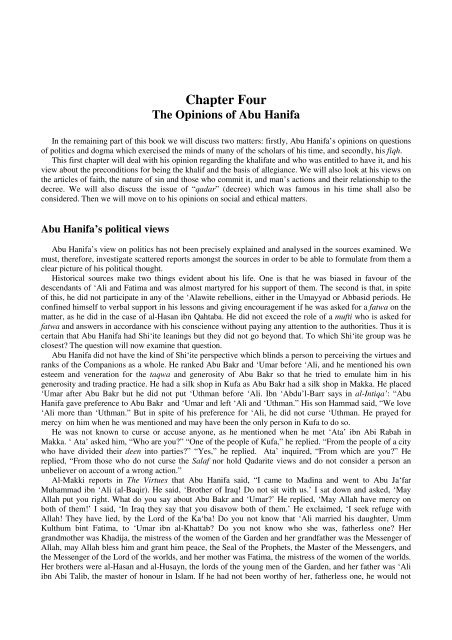You also want an ePaper? Increase the reach of your titles
YUMPU automatically turns print PDFs into web optimized ePapers that Google loves.
Chapter Four<br />
The <strong>Opinions</strong> of <strong>Abu</strong> <strong>Hanifa</strong><br />
In the remaining part of this book we will discuss two matters: firstly, <strong>Abu</strong> <strong>Hanifa</strong>’s opinions on questions<br />
of politics <strong>and</strong> dogma which exercised the minds of many of the scholars of his time, <strong>and</strong> secondly, his fiqh.<br />
This first chapter will deal with his opinion regarding the khalifate <strong>and</strong> who was entitled to have it, <strong>and</strong> his<br />
view about the preconditions for being the khalif <strong>and</strong> the basis of allegiance. We will also look at his views on<br />
the articles of faith, the nature of sin <strong>and</strong> those who commit it, <strong>and</strong> man’s actions <strong>and</strong> their relationship to the<br />
decree. We will also discuss the issue of “qadar” (decree) which was famous in his time shall also be<br />
considered. Then we will move on to his opinions on social <strong>and</strong> ethical matters.<br />
<strong>Abu</strong> <strong>Hanifa</strong>’s political views<br />
<strong>Abu</strong> <strong>Hanifa</strong>’s view on politics has not been precisely explained <strong>and</strong> analysed in the sources examined. We<br />
must, therefore, investigate scattered reports amongst the sources in order to be able to formulate from them a<br />
clear picture of his political thought.<br />
<strong>His</strong>torical sources make two things evident about his life. One is that he was biased in favour of the<br />
descendants of ‘Ali <strong>and</strong> Fatima <strong>and</strong> was almost martyred for his support of them. The second is that, in spite<br />
of this, he did not participate in any of the ‘Alawite rebellions, either in the Umayyad or Abbasid periods. He<br />
confined himself to verbal support in his lessons <strong>and</strong> giving encouragement if he was asked for a fatwa on the<br />
matter, as he did in the case of al-Hasan ibn Qahtaba. He did not exceed the role of a mufti who is asked for<br />
fatwa <strong>and</strong> answers in accordance with his conscience without paying any attention to the authorities. Thus it is<br />
certain that <strong>Abu</strong> <strong>Hanifa</strong> had Shi‘ite leanings but they did not go beyond that. To which Shi‘ite group was he<br />
closest? The question will now examine that question.<br />
<strong>Abu</strong> <strong>Hanifa</strong> did not have the kind of Shi‘ite perspective which blinds a person to perceiving the virtues <strong>and</strong><br />
ranks of the Companions as a whole. He ranked <strong>Abu</strong> Bakr <strong>and</strong> ‘Umar before ‘Ali, <strong>and</strong> he mentioned his own<br />
esteem <strong>and</strong> veneration for the taqwa <strong>and</strong> generosity of <strong>Abu</strong> Bakr so that he tried to emulate him in his<br />
generosity <strong>and</strong> trading practice. He had a silk shop in Kufa as <strong>Abu</strong> Bakr had a silk shop in Makka. He placed<br />
‘Umar after <strong>Abu</strong> Bakr but he did not put ‘Uthman before ‘Ali. Ibn ‘Abdu’l-Barr says in al-Intiqa’: “<strong>Abu</strong><br />
<strong>Hanifa</strong> gave preference to <strong>Abu</strong> Bakr <strong>and</strong> ‘Umar <strong>and</strong> left ‘Ali <strong>and</strong> ‘Uthman.” <strong>His</strong> son Hammad said, “We love<br />
‘Ali more than ‘Uthman.” But in spite of his preference for ‘Ali, he did not curse ‘Uthman. He prayed for<br />
mercy on him when he was mentioned <strong>and</strong> may have been the only person in Kufa to do so.<br />
He was not known to curse or accuse anyone, as he mentioned when he met ‘Ata’ ibn Abi Rabah in<br />
Makka. ‘ Ata’ asked him, “Who are you?” “One of the people of Kufa,” he replied. “From the people of a city<br />
who have divided their deen into parties?” “Yes,” he replied. Ata’ inquired, “From which are you?” He<br />
replied, “From those who do not curse the Salaf nor hold Qadarite views <strong>and</strong> do not consider a person an<br />
unbeliever on account of a wrong action.”<br />
Al-Makki reports in The Virtues that <strong>Abu</strong> <strong>Hanifa</strong> said, “I came to Madina <strong>and</strong> went to <strong>Abu</strong> Ja‘far<br />
Muhammad ibn ‘Ali (al-Baqir). He said, ‘Brother of Iraq! Do not sit with us.’ I sat down <strong>and</strong> asked, ‘May<br />
Allah put you right. What do you say about <strong>Abu</strong> Bakr <strong>and</strong> ‘Umar?’ He replied, ‘May Allah have mercy on<br />
both of them!’ I said, ‘In Iraq they say that you disavow both of them.’ He exclaimed, ‘I seek refuge with<br />
Allah! They have lied, by the Lord of the Ka‘ba! Do you not know that ‘Ali married his daughter, Umm<br />
Kulthum bint Fatima, to ‘Umar ibn al-Khattab? Do you not know who she was, fatherless one? Her<br />
gr<strong>and</strong>mother was Khadija, the mistress of the women of the Garden <strong>and</strong> her gr<strong>and</strong>father was the Messenger of<br />
Allah, may Allah bless him <strong>and</strong> grant him peace, the Seal of the Prophets, the Master of the Messengers, <strong>and</strong><br />
the Messenger of the Lord of the worlds, <strong>and</strong> her mother was Fatima, the mistress of the women of the worlds.<br />
Her brothers were al-Hasan <strong>and</strong> al-Husayn, the lords of the young men of the Garden, <strong>and</strong> her father was ‘Ali<br />
ibn Abi Talib, the master of honour in Islam. If he had not been worthy of her, fatherless one, he would not














